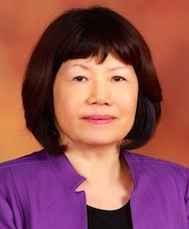
 Professor Fan Chung Graham retired this month from her dual appointments in Computer Science and Engineering and Mathematics, also relinquishing her endowed chair as the Paul Erdős Professor in Combinatorics. But that's not the end of the story. Later this summer she will assume a part-time research professorship which will allow her to continue conducting research and advising graduate students. The change in status comes as she receives one of the highest honors available to scholars in her native Taiwan.
Professor Fan Chung Graham retired this month from her dual appointments in Computer Science and Engineering and Mathematics, also relinquishing her endowed chair as the Paul Erdős Professor in Combinatorics. But that's not the end of the story. Later this summer she will assume a part-time research professorship which will allow her to continue conducting research and advising graduate students. The change in status comes as she receives one of the highest honors available to scholars in her native Taiwan.
Every two years the Academia Sinica elects new members, and the latest roster of distinguished academics was announced at the academy's biennial convocation in early July. Chung (at right) was one of only three women 'academicians' elected to the Academia Sinica from a class of 20 mostly male inductees in 2016. The academy is Taiwan's closest analog to the combined U.S. National Academies. Founded in 1928 in the Republic of China, it was re-established in Taipei, Taiwan, to promote scholarly research in the sciences and humanities following the Communist takeover in China.
That was in 1949, the same year that Fan Chung was born. She graduated from National Taiwan University in 1970, and went on to earn her Ph.D. in Mathematics from the University of Pennsylvania in 1974.
 From there she worked for 19 years, first at Bell Labs then at Bellcore. It was at Bell Labs that she met and later married fellow mathematician Ronald Graham in 1983. (Ron Graham also recently retired from CSE but will resume a part-time appointment in CSE while also remaining Chief Scientist of Calit2.) After a stint at the Institute for Advanced Study (1990-1992), Fan Chung became a professor of Mathematics as well as Computer and Information Science at her alma mater, UPenn, before moving to CSE and Math at UC San Diego in 1998.
From there she worked for 19 years, first at Bell Labs then at Bellcore. It was at Bell Labs that she met and later married fellow mathematician Ronald Graham in 1983. (Ron Graham also recently retired from CSE but will resume a part-time appointment in CSE while also remaining Chief Scientist of Calit2.) After a stint at the Institute for Advanced Study (1990-1992), Fan Chung became a professor of Mathematics as well as Computer and Information Science at her alma mater, UPenn, before moving to CSE and Math at UC San Diego in 1998.
[At left: Ron and Fan Chung Graham with their longtime co-author and Hungarian math genius Paul Erdős.]
In announcing the new class of members, the Academia Sinica noted Fan Chung Graham's fundamental contributions. "Her recent research has been instrumental in establishing the foundations of spectral graph theory," noted the academy, which also pointed to her book on random graph theory that "provides the foundation for quantitative and rigorous analysis for modeling and analyzing large complex networks." Chung is also credited with introducing and developing the concept of quasirandomness. Working with Hungarian mathematician Paul Erdős (for whom her endowed chair was named), Chung also "determined the sizes and structure of unavoidable graphs and hypergraphs," according to Academia Sinica. "In recent years, she has [also] done seminal work on the quantitative analysis for ranking algorithms in graphs."

